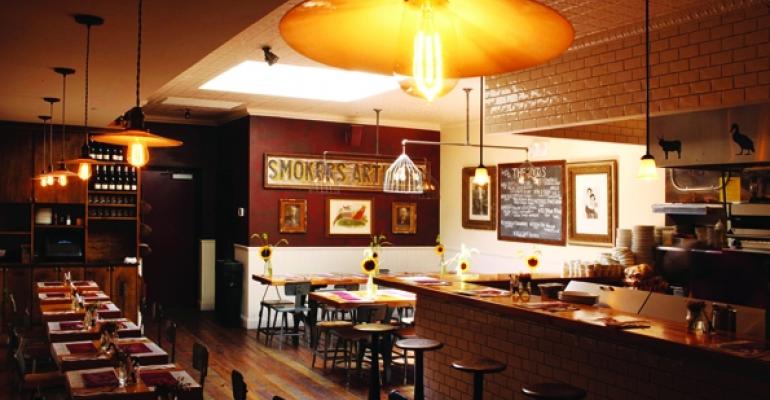![]() Until three years ago few people thought of meatballs as being hip. But that’s changed thanks to The Meatball Shop, a casual-dining chain created by chef Daniel Holzman and bar specialist Michael Chernow.
Until three years ago few people thought of meatballs as being hip. But that’s changed thanks to The Meatball Shop, a casual-dining chain created by chef Daniel Holzman and bar specialist Michael Chernow.
The longtime friends and New Yorkers, relying on multiple investors and sweat equity, opened the first Meatball Shop on Stanton Street in the city’s Lower East Side neighborhood in early 2010. It measured 1,000 square feet, had 39 seats and cost less than $400,000 to develop, Holzman said.
The two quickly won over diners and inspired other meatball restaurants with their $3-to-$9 assortment of balls-and-sauce dishes, interesting sides and salads, and gourmet ice cream sandwiches — not to mention a thoughtful selection of draft beers and wines by the glass, and a 4 a.m. weekend closing time.
Today, Chernow, the chain’s general manager, and Holzman, its executive chef, also operate a 70-seat Meatball Shop in the Williamsburg neighborhood of Brooklyn, N.Y., and a 55-seat unit in New York’s West Village. Their company, Meatball Management LLC, expects to open a Chelsea branch in February and an Upper East Side location this spring.
Chernow said the chain, which has an average per-person check of $17.50, primarily targets young professionals in their late 20s and early 30s, but also appeals to children and seniors. On average, he said, each of its locations serves 2,500 to 3,000 guests weekly.
![]() Restaurant watchers Greg Morabito, Eater.com’s New York editor, and Josh Ozersky, Time Magazine’s food and dining columnist, have ideas about why The Meatball Shop is successful.
Restaurant watchers Greg Morabito, Eater.com’s New York editor, and Josh Ozersky, Time Magazine’s food and dining columnist, have ideas about why The Meatball Shop is successful.
“It's one of the only ‘hip’ restaurants in New York City where two people can dine out in a cool space and have a full meal for under $30,” Morabito said, adding that he considers its price point the strongest part of the well-executed concept.
Ozersky said The Meatball Shop is “essentially a dream match of audience, operator and product. [It features] a simple dish that everybody loves [and] can be prepared ahead of time, and has a young, frisky clientele that wants to eat whenever they feel like it,” he noted, adding that Chernow and Holzman’s high quality-control standards are critical to the success of the business.
Alcoholic beverage sales range from 25 percent to 30 percent of total sales at the restaurants, with fully licensed sites performing better, Chernow said.
Holzman said dine-in guests generate 80 percent to 90 percent of sales at the restaurants, depending on the site, with takeout accounting for the rest.
![]() The Meatball Shop’s core menu offers a variety of golf-ball-sized meatballs — Classic Beef, Spicy Pork, Chicken, Vegetable and a daily special — and five regular sauces, including Spicy Meat Sauce, Mushroom Gravy and Parmesan Cream.
The Meatball Shop’s core menu offers a variety of golf-ball-sized meatballs — Classic Beef, Spicy Pork, Chicken, Vegetable and a daily special — and five regular sauces, including Spicy Meat Sauce, Mushroom Gravy and Parmesan Cream.
Meatballs come “naked,” or served four to the order with one sauce and focaccia, $7; rolled three at a time into a “hero” sandwich with a choice of sauce and cheese, $10; presented as a two-ball “smash” between pieces of brioche, $9; or delivered as “sliders,” one ball and one sauce on one tiny bun, $3.
Sauces, meatballs, cookies and ice creams are prepared in a commissary, Holzman said.
Before opening The Meatball Shop, Holzman worked in the kitchens of several notable East and West Coast restaurants, including Le Bernardin and Paladin in New York; Axe in Los Angeles, as chef; and SPQR in San Francisco, as chef and co-owner.
Chernow, who has a degree in culinary arts and restaurant management from the French Culinary Institute, previously worked in bars on both coasts, including Frank in New York, where he managed the bar for seven years.
He said he and Holzman, who now have a single financial partner, believe The Meatball Shop “has legs.”
“We’ve made the decision to grow slow and steadily,” Chernow explained. “Our three-year plan is to cover all the markets in New York City we’d like to be in.”
Contact Alan J. Liddle at [email protected].
Follow him on Twitter: @AJ_NRN





